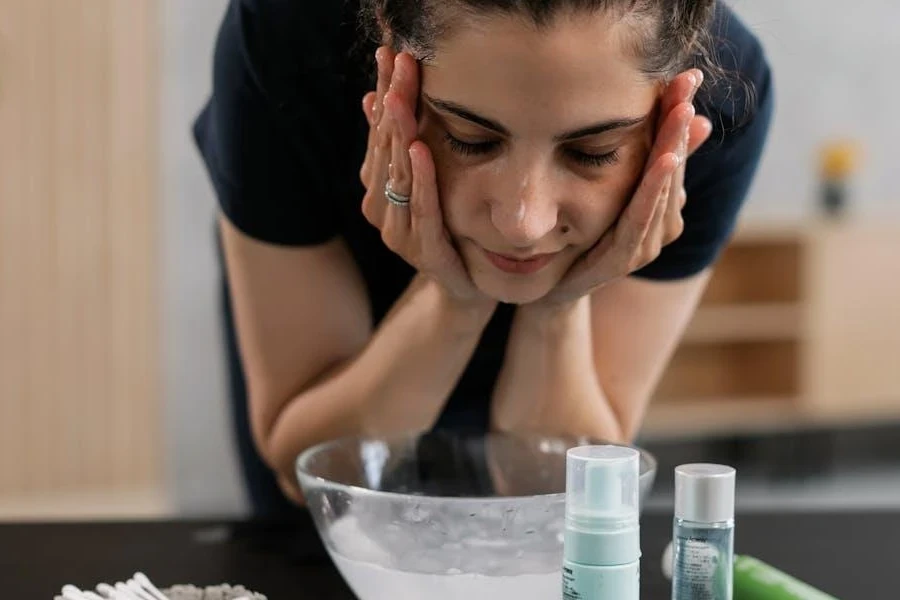Bar soaps have been the go-to way to wash dirt and grime from the face and other body parts for ages. But while the classic bar still remains effective in its own way, the rise of face wash in the market can be attributed to the fact that it does a better job of pampering ones skin without having too many irritating ingredients like those in traditional soap bars.
No doubt, a good face wash is a critical part of any successful skincare routine, but knowing which is suitable for different skin types is crucial. This article offers a complete guide to choosing high-quality face wash for various consumers in 2025.
Table of Contents
Are face washes still popular?
What are face washes?
Face washes: What to consider when choosing them
Bottom line
Are face washes still popular?
Face washes remain one of the most popular skin care products today. IMARC Group said the global face wash market’s 2023 value was US$ 27.5 billion. However, they believe the market will cross US$ 38.2 billion by 2032, growing at a 4.1% compound annual growth rate (CAGR). The market is witnessing impressive growth due to rising skincare/hygiene awareness, ingredient innovations, and the growth of the middle-class population in emerging markets.
North America and Europe are the two largest markets for face wash products, while Asia Pacific and Latin America are growing regions. Face washes also have an impressive search volume. According to Google data, face washes registered a consistent 673,000 searches monthly from April to July 2024.
What are face washes?

Face washes are often water-based formulas that generate lather as consumers rub them into their skin. This lathering action pushes the formula deep into the user’s pores, giving them a deeper cleanse. However, it may be too much for some skin types to handle.
What makes face washes stand out is their better alternative to soaps. They are not as abrasive as bar saps, giving consumers gentler, more efficient cleansing. Additionally, face washes have ingredients for different skin types, making them great for various consumers.
Face washes: What to consider when choosing them
1. Skin type

Retailers can’t stock face washes without considering the consumer’s skin type. In the beauty world, all skins are not the same, so it makes sense that consumers need different products for the best possible experience. There are up to five skin types: dry, oily, acne-prone, normal, and sensitive.
I. Normal skin types
Consumers with normal skin always want face wash products with a healthy balance of benefits and ingredients. Their ideal product can gently cleanse the skin without removing its natural oils, allowing users to have a refreshing and invigorating experience. Hence, face washes for normal skin may contain mild, hydrating ingredients like chamomile and aloe vera.
II. Dry skin types
Consumers with dry skin must retain moisture to avoid flakiness and excessive dryness. For this reason, face washes for dry skin have nourishing and hydrating benefits, thanks to ingredients like glycerin, hyaluronic acid, or shea butter.
III. Oily skin types
These consumers produce more sebum than usual, which results in clogged pores and annoying acne. That’s why consumers with oily skin need face washes that offer deep cleansing and oil production control. Such face washes contain ingredients like tea tree oil and salicylic acid.
IV. Acne-prone skin types
Consumers with more acne breakouts often need specialized face washes to help fight the acne-causing bacteria and inflammation. These face washes contain sulfur or benzoyl peroxide, both popular ingredients for fighting acne.
V. Sensitive skin types
Consumers with sensitive skin get irritated easily. Hence, they only use gentle, hypoallergenic products, including face washes. These options don’t have fragrances or harsh ingredients that can trigger sensitive skin. Common skin-friendly ingredients include aloe vera, oatmeal, and calendula.
2. Face wash type

The next thing consumers look at when choosing face washes is the type. Face washes come in different varieties, allowing each skin type to find the best option. The options include gel, powder, foam, liquid, and collagen-based face washes.
I. Gel face washes
Gel-based face washes are incredibly popular and versatile. Consumers love them for their smooth, transparent texture that works on most skin types. In addition, gel-based face washes are perfect for removing dirt, impurities, and excess oil while cleansing the skin without excessive drying. Some options contain hydrating ingredients, opening gel-based washes to dry and oily (or combination) skin.
II. Powder-based face washes
Powder-based face washes are gaining more attention because of their customization nature and unique formula. These products come in dry powder form, allowing consumers to turn them into a washing paste by adding water. This way, consumers can easily control the intensity and consistency of their face wash’s exfoliation.
More importantly, powder face washes contain gentle exfoliating ingredients, like bran, rice, fruit enzymes, and oatmeal. For this reason, sensitive or acne-prone consumers can use them to unclog their pores, remove dead pores, and get better complexions without triggering unwanted reactions.
III. Foam-based face washes

These face washes have a light and airy feel that many people find luxurious. They start as a liquid but become rich foams when consumers rub them on damp skin. Foam-based face washes are the go-to for gentle and thorough washing, making it fantastic for all skin types, including sensitive and dry.
Many foam-based face washes come with soothing and hydrating ingredients. Even better, these ingredients allow users to enjoy a different sensory experience than other types.
IV. Liquid face washes
Liquid-based face washes include various products, from traditional liquid options to oil-based formulas. They are versatile and suitable for different skin types and needs. Additionally, liquid face washes come in different textures, like creamy, oil-based, or water-based.
Also, depending on their ingredients, these face washes can remove makeup, cleanse the skin well, and target specific issues like hydration, anti-aging, or acne.
V. Collagen-based face washes
These face washes are popular for their anti-aging benefits. Collagen is a natural skin protein that decreases with age, causing wrinkles and sagging. However, collagen-based face washes have formulas that boost collagen levels and stimulate the protein’s production.
They often include collagen peptides, antioxidants, and vitamins to support healthy, rejuvenated skin. Manufacturers also promote collagen-based face washes to prevent and reduce signs of aging, like sagging and fine lines.
3. Size

Size matters a lot when choosing face washes to sell. Since they mostly come in liquid or gel form, here are some of the most common sizes and why consumers may choose them.
I. 50 ML
These smaller bottles are popular for several reasons. They are convenient for travel and for people with busy lives. The compact size also appeals to those who like to try different face washes without buying a large bottle.
II. 50ML-200ML
The 50ML-200ML range is popular for its balance of convenience and value. These versatile sizes offer enough product for regular use without being too bulky. People often choose face washes in this size range because they are affordable and long-lasting.
III. 200ML-400ML
This size range features larger bottles popular with consumers who like to buy in bulk or make single purchases that last a long time. These larger sizes have a reputation for being cost-effective options for women with regular skincare routines.
Bottom line
Face washes are fantastic beauty products that can easily keep the skin clean without harming it. However, retailers must not confuse them with face cleansers. Although most use these product names interchangeably, both face washes do various things with different formulas.
While face cleansers have formulas that hydrate, purify, and soothe the skin, face washes target the pores for deeper cleansing. Plus, they often lather into foam when consumers use them on damp skin. Now that the differences are clearer, business buyers can use this guide to learn how to stock the best face washes for 2025.




